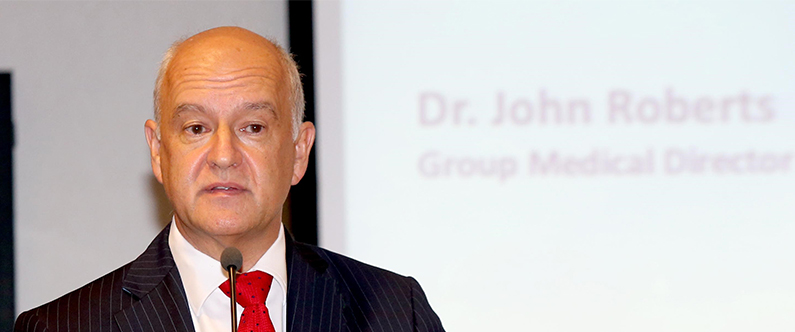WCM-Q Grand Rounds hears from aviation medicine expert

Dr. Arthur John Roberts, Group Medical Director for Qatar Airways, spoke at Weill Cornell Medicine-Qatar’s (WCM-Q) Grand Rounds to give healthcare practitioners advice on the essential principles of aviation medicine.
Dr. Roberts described the physiological challenges posed by the aviation environment, identified health conditions that might be negatively impacted by air travel and summarized the information needed by airline medical departments to decide Fitness to Fly issues.
Aircraft cabins are pressurized to provide sufficient oxygen to allow human to survive at altitudes of 35,000 feet and above, but the air that passengers breathe has less oxygen than the air at sea level. In fact, the air onboard has about the same amount of oxygen as is found in the air on the ground at around 8,000 feet. This causes oxygen saturation in the blood to drop, explained Dr. Roberts, placing stress on the body.
He said: “Despite all the engineering controls in place, the cabin environment is still not the same as being at sea level. While it’s perfectly safe for the vast majority of people to fly, there may be some people who, although they are fit to be discharged from a hospital or clinic, they may not be well enough to fly completely risk free.”
Dr. Roberts then discussed health conditions that can be negatively affected by flying, which include mental health issues, cardiac illness, respiratory illness, recent surgeries, pregnancy, neurological issues, eye conditions and injuries, ear, nose and throat complaints, gastrointestinal conditions, anemia, infectious diseases, orthopedic conditions and injuries, diabetes and many more. Dr. Roberts referred the audience to guidance provided by the International Air Transport Association (IATA) regarding these health issues and flying.
Healthcare practitioners should also consider that patients will be isolated from medical care while in the air, and that time differences may impact medication schedules, he said. Dr. Roberts also highlighted the importance of medical information forms, which physicians can use to provide comprehensive health information about patients to help the airline determine if they are fit to fly.
The lecture, titled Aviation Medicine – What All Healthcare Practitioners Need to Know, was accredited locally by the Qatar Council for Healthcare Practitioners-Accreditation Department (QCHP-AD) and internationally by the Accreditation Council for Continuing Medical Education (ACCME).